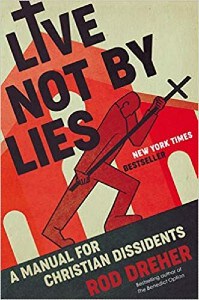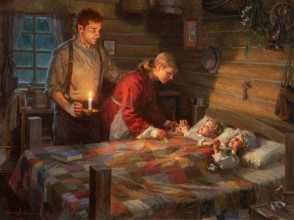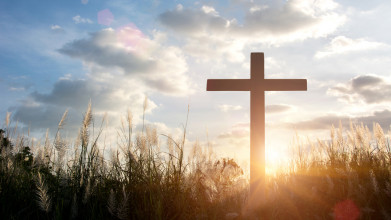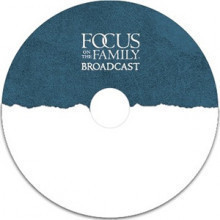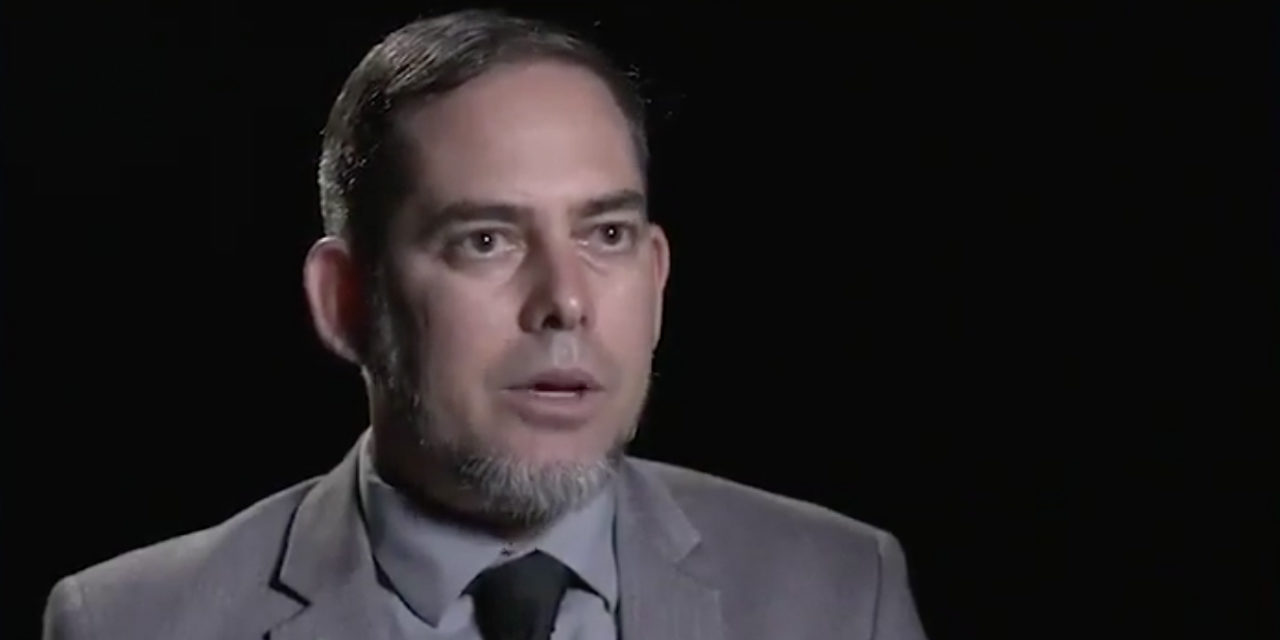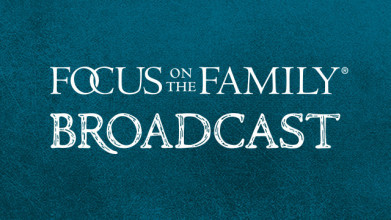Preview
Rod Dreher: For Christians, hope is not the same thing as optimism. An optimist thinks things will always turn out okay. Well, that’s not really true. I mean, look at what has happened to the church over the, our 2,000 years of history. We’re a church of martyrs and confessors.
End of Preview
John Fuller: That’s Rod Dreher and he’s our guest today on Focus on the Family. It’s one of our top programs of the year as we’re just beginning our best of the best airings from 2022. Rod shared some really powerful stories of Christians who served God amid persecution and our listeners responded in a really big way, so thank you for letting us know how much this program meant to you. I do hope you’ll stay tuned for this encore presentation of how we, as believers, can live faithfully in a hostile culture. Your host is Focus on the Family president Jim Daly and I’m John Fuller.
Jim Daly: John, it is so humbling to hear some of the hardships Christians go through, not only right now, but over the centuries. Uh, you know, I had the privilege to travel for Focus in our international work for probably 12, 13 years, and I went to about 70 countries during that time, including the former Soviet Union. When Gorbachev was taken hostage, I was actually there in Moscow. We were there for a four or five day, uh, trip and Dr. Dobson and others were coming in to meet with Gorbachev, actually. It really was interesting to watch the communist country kind of go through its final travails there as I was right near Yeltsin’s White House, as they called it. Uh, when we aired this broadcast earlier in the year, we had a listener thank us and tell us that they had come from a communist country and how grieved they were to see America heading in that direction. Think of that. They were in prayer that our churches would wake up to the challenges facing us. But it always catches my interest to talk about how the church should react in an increasingly Godless culture, and I’m excited to hear from our guest today who has done some amazing interviews around the world, but primarily in the East Bloc. He’ll help us to identify what communism, socialism, and totalitarianism look like right at the beginning and some would say like we are experiencing here in America.
John: Well, there are so many applications for us today coming out of the work that Rod Dreher did for his book, Live Not by Lies: A Manual for Christian Dissidents. Rod is a journalist and has written a number of other books, uh, but the foundation of our conversation today is Live Not by Lies. Learn more about it and make a donation, if you can, when you call 800, the letter A, and the word FAMILY, or when you stop by focusonthefamily.com/broadcast. Let’s go ahead now and join this best of the best broadcast from 2022. Here’s Jim Daly.
Jim: Rod, uh, welcome to Focus on the Family.
Rod: It’s great to be here, Jim. Thanks for having me.
Jim: It, it’s really good to have you here because I love, uh, cultural observers. You know, Os Guinness does that. You’re doing that. Uh, as I mentioned, you interviewed dozens of believers who suffered for their faith under communism, um, and these are mature Christians. Uh, in my experience, these are not the milquetoast Christians that the apostle Paul was talking about. These are people that are committed. Uh, they have, in some cases, given their lives for the faith and for the expression of freedom. What did you take away from your conversations with them?
Rod: Oh, wow, that’s … first of all, humility. You know, I’m blessed, we’re all blessed, to have grown up in the United States with the blessing of religious liberty, and, uh, to go over there, though, and talk to Christians, and I went to Russia, I went to, uh, Poland, to Hungary, Czech Republic, Slovakia, to talk to Christians who had had to pay a real price, the loss of liberty, in some cases, even torture, for the Gospel, it made me realize, first of all, how blessed we have been in America, but also it made me realize that we have so much to learn from them. And, to be honest with you, the reason I got over there in the first place was because, back in 2015, I think it was, I got a phone call from an American physician who was really frantic. He told me that his mother, who had spent four years in a Czech prison in the 1950s because she refused to stop going to church, she emigrated to America and has lived her most of her life, but she said, “Son, the things I see happening in America today remind me of what I escaped from.” I thought that was really alarmist, but I made a point, Jim, every time I would travel and I would meet people who had grown up in the Soviet Union or the Soviet Bloc and had come to America, uh, during the Cold War, I would just ask them, “Are the things you’re seeing today, does it remind you of what you left behind?” Every single one of them said yes and, if you talk to them long enough, they get angry that American Christians won’t take them seriously.
Jim: Well, and I think it’s important for us to know what that looks like. What are they expressing that we should be concerned about? I mean, for some people, we’re so blinded we don’t even see it right in front of us. They’ve had the experience of seeing a government take control of people’s liberties and squash them, and I think that’s the right question. What are they seeing?
Rod: They’re seeing cancel culture going everywhere. They’re seeing people having to be afraid for their jobs, for their livelihoods, and for their reputation.
Jim: Well, and, uh, afraid to speak their mind, right?
Rod: Exactly.
Jim: That’s the point.
Rod: Yeah, exactly. They get on the wrong side of the ideology. And what’s interesting about this, Jim, is it’s not just coming from the government. It may not, at this point, even primarily be coming from the government. It’s coming from the fact that the left has taken over all of the major institutions of American society. It started at the universities and the media and now it’s expanded to big business, to sports, uh, to law, to medicine, even the US military. We call it wokeness. This is a softer form of the totalitarianism they left behind, and these people, these emigres, these precious people who came to this country looking for freedom, they’re warning us, “If you don’t step out of your complacent, comfortable zone and speak out now and make a preparation for what’s coming, it’s going to be too late.”
Jim: Uh, Rod, I, I have had some taste of this when I traveled, as I mentioned, uh, being in the Soviet Union. I also went to Cuba when Fidel Castro was still in power. I went with Dave Dravecky, a former major league baseball pitcher, and he did a clinic and we talked to people.
Rod: Mm-hmm.
Jim: Uh, been to China. In those contexts, uh, one of the things that is an early indicator of a problem is when we have to speak in code.
Rod: Mm-hmm.
Jim: You know, we stop speaking our mind. We start saying, “Well, we, we’ve got to say it differently because somebody may be offended by what we say,” and I think that’s an early indicator of a problem.
Rod: Absolutely. I was in Russia on the National Day of Remembrance for, uh, the victims of political violence. I went out to the national monument, which is a field called Butovo field, south of Moscow, where the KGB, in a 14-month period in the 1930s, massacred 25,000 people on that field. Today, it is the national monument to remember them. While I was there, I was looking at, uh, a poster to help me orient myself to the site. Uh, an older Russian man came up and asked me, said, “What are you doing here?” He asked through my translator, and the translator explained to him that I was working on this book about what I call soft totalitarianism. And, uh, the translator said, “People in America are losing their jobs now because they get on the wrong side of this ideology.” That old Russian, who was there to pray for his family members who were murdered there, he said, “That’s always the first sign, when people have to fear for their jobs because, uh, they’re on the wrong side of the ruling ideology.”
Jim: Right. It forces you to pick livelihood versus your convictions and, I mean, the founding of America was not built with that premise.
Rod: No.
Jim: It was built with the i- idea that you could express yourself freely, especially in the religious area, right?
Rod: Exactly. And, you know, one thing too, Jim, that blinds us Americans to, to what’s actually happening, well, first of all, it’s what Aleksandr Solzhenitsyn said, people outside of Russia think that what happened there could never happen in our country, but, in fact, it could happen in any country on earth under the right circumstances. And, uh, the second aspect that blinds people is, when we think of totalitarianism, we think of the Gulags, we think of the secret police, we think of bread lines, all the stuff that’s from the Cold War, and we think of George Orwell’s 1984. Well, we don’t have that today, so how could this be totalitarianism? This is a new form of totalitarianism that’s taking power through softer means, by marching through the institutions and not terrifying people and making them fear in order to conform, but rather telling them, like, “Look, if you want to have a good life, a good middle-class life, to advance in, in corporate, the corporate world, et cetera, then you need to sign on to this ideology and, if not, you’ll be on the outside.” Well, so many of us Americans don’t understand what it means to suffer for the faith and so we find ways to rationalize our cooperation with Caesar in this way.
Jim: Yeah. Uh, Rod, one of the difficulties, if you watch the news or just have a conversation at work, something like that, this concept, it’s the title of your book, Live Not by Lies, which is a line from Aleksandr Solzhenitsyn-
Rod: Mm-hmm.
Jim: … um, it’s hard for people, especially, if I could just say, us average people-
Rod: Sure.
Jim: … to comprehend what is true right now because, even in the expression of news, you’ve got left-leaning news, you got right-leaning news, and you can’t say, “This is a hand.”
Rod: Right.
Jim: I mean, it’s like we can’t agree that this is a hand. I’m holding my hand up-
Rod: Yeah.
Jim: … for the audio listeners (laughs).
Rod: Mm-hmm.
Jim: But, I mean, that … it, it’s that absurd right now. And so to get to the point, live not by lies, I guess the first thing you have to do is define what is true.
Rod: This is one of the core problems that we face today and this is one of the things I learned from the, uh, Christians who suffered under communism. They said that you have got to make a stand in truth. You’ve got to know what you believe and stand there and defend it, because one of the things that totalitarians will do is try to confuse you and make you think that truth is totally relative. If you can’t stand firmly on truth, uncompromisingly on truth, then you’re not going to make it through what they throw at you. And, uh, this is something that so many normal people think that we can just get past it if we just vote the right people in. If I can give you one quick example, uh, you probably know Ryan T. Anderson, the head of the Ethics and Public Policy Center-
Jim: Mm-hmm.
Rod: … in Washington, a very brave warrior for traditional, uh, values and for the traditional family. Ryan wrote a book a couple of years ago called When Harry Became Sally. It’s a response to the transgender moment. Ryan is a very faithful Catholic, but he’s also an incredibly respectful and careful scholar. This is a good book that challenges transgender ideology. Earlier in 2021, Amazon very quietly decided to stop selling the book.
Jim: Right.
Rod: Why? They said that, “We won’t sell books anymore that construe transgenderism as a mental disability or a mental illness.” Well, you know what? That’s their right to do so. In our free country, a bookseller shouldn’t have to sell anything he doesn’t want to sell. I would note, though, that Mein Kampf, Hitler’s book, you can still buy that through Amazon.
John: Mm-hmm.
Rod: But be that as it may, booksellers have the right to do this. But here’s the thing, Amazon controls so much of the retail book market in the United States that, if it decides it is no longer going to sell a certain kind of book, those books will not get published because no publisher can afford to do this. So we have here a case of, uh, a corporate actor using its liberties in the public square to remove from the public square discussion about an important issue like transgenderism. This is the way that the soft totalitarianism is taking place. They haven’t changed laws. The government hasn’t gotten involved here. The, uh … when you have places like booksellers, publishers, media, corporations, et cetera, deciding, within their rights, their constitutional rights to, to abandon liberalism, classical liberalism, this is what you get.
Jim: So true, and that’s why we prefer people (laughs) to do exactly what you’re saying, get the resource through Focus on the Family.
John: Mm-hmm.
Jim: You know, we’re not paying shareholders.
Rod: Right.
Jim: All of that goes back into ministry and, uh, you should get Rod’s book right here from Focus.
John: Yeah. It’s called Live Not by Lies: A Manual for Christian Dissidents, and you can get your copy when you call 800, the letter A, and the word FAMILY, or stop by our website, focusonthefamily.com/broadcast.
Jim: Rod, let’s go back to that idea of Live Not by Lies, the title of your book, the quote of Aleksandr Solzhenitsyn. You have a illustration in your book, I think by Havel’s, uh-
Rod: Havel’s greengrocer.
Jim: … greengrocer. Describe that and what does it communicate?
Rod: Sure. Well, Vaclav Havel was a dissident in the same era of Solzhenitsyn and he later became the first president of a free Czechoslovakia, and he, uh, in a 1977 essay called “The Power of the Powerless,” he talked about how people who had no political power could nevertheless step out and effect change. And, uh, this is a principle that Solzhenitsyn, uh, started out with in his essay “Live Not by Lies,” but Havel really explored it, and he invented a parable of a greengrocer. He said, “Imagine that you have someone who sells fruits and vegetables in a communist city. Uh, all the businesses in town have to hang up the sign in the window, ‘Workers of the world, unite,’ the Marxist slogan. Nobody believes it, but they hang that sign there just to avoid trouble.” “Well, what happens,” says Havel, “if the greengrocer one day says, ‘You know what? I’m not going to live by this lie anymore,’ and he takes the sign down? Well, the secret police will come take him away. They will seize his business. He will be forced to be a janitor or something. His family won’t be able to travel. His kids won’t be able to get into good colleges, et cetera. He will pay a price. But what has he gained?”, says Havel. “He has shown that, if you are willing to suffer for your convictions, then you don’t have to live by lies, that conforming to the system is not inevitable for those who are prepared to suffer. And, when other people see that he has been willing to live by his convictions and suffer for them, they’ll be drawn to that and, eventually, this will overturn the government.”
Jim: Rod, our goal here is not to, I think, spin people into a negativity.
Rod: Sure.
Jim: And what I want to do with, uh, at least some of the time we have left is talk about what God would expect of us-
Rod: Sure.
Jim: … um, what we as Christians should do to preserve these liberties and, uh, to fight for the things that are right?
Rod: Right.
Jim: H- how do you balance all that?
Rod: Well, I, I want to assure your listeners and your viewers that this is a hopeful book. It’s a scary book because the things that the people who endured communism, the Christians who endured communism, the things they’re talking about are pretty scary. We’ve not seen that in this country before, and they are convinced, and I am too, that it is coming one way or the other. But what they say is do not lose hope, that, for Christians, hope is not the same thing as optimism. An optimist thinks things will always turn out okay. Well, that’s not really true. I mean, look at, look at what has happened to the church over the, our 2,000 years of history. We’re a church of martyrs and confessors. But a Chri-, for a Christian, hope is that, if you suffer faithfully for Jesus Christ and you’re willing to take whatever the world throws out at you, then you will triumph. The Lord will triumph through your sacrifice. And, uh, these people I talked to over there, not one of them, Jim, expected to live to see the end of communism. They resisted it because they’re believers and because it was the right thing to do and yet the Lord surprised them. I think we need to be thinking that way, but we can’t think past the fact that we Christians in America are going to be called to suffer, and this is the key that the dissidents in Eastern Europe told me that got them through this. I talked to this one Baptist pastor in Russia. I remember Yuri Cipko was his name. We’re standing on the street corner in Moscow in early November, the snow is starting to fall, and he looked at me in the eye and said, “Go back to America and tell the church, ‘If you’re not prepared to suffer for our Lord Jesus Christ, you’re not going to make it through what’s coming.'” That is the key message of this book. Now people don’t want to hear that we’re going to have to suffer, but this has been the story of the Christian church since the very beginning.
Jim: Yeah.
Rod: It is the story of our brothers and sisters in Christ in Muslim countries today, in China, and other nations. Why should we think that the cup is going to pass us by? But, if we suffer faithfully, the Lord will bless us immoderately. I’m convinced of that.
Jim: I agree, and I think we cannot lose who we are in Christ to fight that battle.
Rod: Yeah.
Jim: We have to maintain that identity in Christ through the battle. In fact, from that, I think there was a three-part admonishment for the church to-
Rod: Yeah.
Jim: … pursue, which was see, judge, and act.
Rod: Mm-hmm.
Jim: Describe those three.
John: Mm-hmm.
Rod: This was his simple method of preparing the church, Father Kolakovic’s. This man was, uh, a Catholic priest doing work against the Nazis in his native Zagreb in 1943. He got a note that the Gestapo was coming for him, so he escaped to his mother’s home country, Slovakia, and began teaching in the Catholic university there. He told his students, “The good news is the Germans are going to lose this war. The bad news is the Soviets are going to be ruling this country when it’s over and the first thing they’re going to do is persecute the church. We have to get ready.” So he began building these small prayer groups, mostly of young people, to come together to pray and to ask, uh, God to show them what to do and then to decide how they can build a network so the church could survive persecution. His own bishops in that country chastised him. They said, “This is hogwash, Father. It’s never going to happen here,” but that priest had studied communism because he wanted to be a missionary in the Soviet Union. He knew exactly what was going to happen and he kept working. Sure enough, in 1948, when the Iron Curtain fell over that country, the first thing they did was go after the churches. The fact that there was an underground church in Slovakia for the 40 years of communism is due to the fact that Father Kolakovic and his followers did not listen to the bishops who said, “Oh, it’s all going to be fine,” but they read the signs of the times and they acted. He said that, when groups would come together for prayer and study, he would call on them to see, which to say, look around you at the world around you and figure out, you know, what are the challenges facing the church-
Jim: What is true.
Rod: … what is true, what is true, what is false, to judge, which is to say to talk among yourselves about how, uh, we can understand what’s happening in light of scripture, in light of what our faith teaches us, and then to act is to decide on a plan of action. Don’t just make this a discussion group, but come out of there with a plan to go and do something, something practical that will strengthen the church and make it resilient through what’s to come. This is a simple plan that any Christian group can follow, any prayer group can follow, any Sunday School can follow, but you need to come together and not be afraid to say what you really are seeing because it’s important. And the left doesn’t want us to talk about this. They want us to be lulled into complacency. Unfortunately, there are a lot of people on our side in the church who want us to be lulled into complacency too, but these Christians in the Soviet Bloc, former Soviet Bloc, they warn us that complacency is our deadly enemy. Last point, this one woman I talked to, amazing woman, Camilla Bendova, I hope we could talk more about her, she told me, “Rod, you mustn’t think that most Christians over her in the communist countries stood firm. Most Christians capitulated, kept their heads down, conformed, because they didn’t want trouble. So, uh, the people you’re trying to reach in the American church, don’t expect that most of them will listen to you, but those who do, those who are willing to take up their cross and suffer for the sake of the Gospel, suffer in the public square, they will be the ones that hold on to Christianity and pass it to next generation once the crisis is past.”
Jim: Rod, uh, I think, when you hear this, there’s going to be kind of two responses. Some people may be kind of excited to live in a time when God is on the move and we have to be bold for the Lord, and others, like you said, that, um, our friends in the East Bloc observed, they shrink back, they don’t want the confrontation or the conflict. Why do you think, after talking to all these people, the, the dissidents, um, what got them through that persecution? What was the end result?
Rod: Well, they would all say that their faith got them through it, and that’s true, but I think that the core part of their faith that got them through it was that they all had a theology of suffering. They knew, on faith, that their suffering meant something, that it wasn’t just meaningless, that they offered their sacrifices to the Lord, and they knew, because they knew their church history, that they may be called to be martyrs, you know, for Christ, but that the Lord brings good out of that. They were willing to suffer death in this world before, um, apostatizing. So I, I like to tell people, when I talk about this book and about my previous book, The Benedict Option, I say that we need to prepare ourselves as Christians to live like Shadrach, Meshach, and Abednego did in, uh, in captivity in Babylon. They served the king, living in that world, but they also knew who they were to the point that, when they were asked to bow down before the false idol, they were prepared to die bef-, rather than betray the Lord that way. That’s the same mentality that got these Christians of the Communist Bloc through all the torture and persecution. Their suffering had meaning. They, they were joining Jesus on the cross.
Jim: Rod, one of, one of the difficult concepts here is the idea that this life is temporary, that this isn’t the life. Uh, we’re passport holders of heaven as Christians, not of the United States or of this world. How do, how do you encourage people to think of the bigger picture here, that we’re all going to die at some point-
Rod: Mm-hmm.
Jim: … in this life, but, for Christians, it’s the step into eternal life with the Father.
Rod: That’s right.
Jim: But why, why do we, as Christians, even struggle understanding the long-term nature (laughs) of eternity versus temporary?
Rod: Yeah. I wonder, Jim, if it’s that we don’t know enough about the experiences of the early church and the age of martyrdom and we don’t know enough about the experiences of Christians today in the 21st century, like the Chinese people you were mentioning, like the Christians of the Near East who have been so viciously persecuted. Uh, we should be asking ourselves why is it that a couple years ago on that beach in Libya when Isis beheaded 24 Egyptian Christians, any one of those Christians could’ve saved his life by renouncing Christianity and accepting Islam, but all of them knew that to do that would be to apostatize and to go to hell. They knew that it was an honor to suffer even death for the Lord, and they now, back in their home culture in Egypt, the churches recognize them as martyrs, as people to be emulated. I think in, in America, we tend to be so present-focused that we’re, we don’t even pay attention to the experience of the church in centuries past or in other countries now and so suffering doesn’t make sense to us. It does make sense to these people, though, because they know that this was ordinary Christianity in history.
Jim: Yeah.
Rod: I’ll say one more thing. The … Pastor Richard Wurmbrand, who was a Lutheran who suffered in the Romanian Gulag, um, he wrote a book called Tortured for Christ that many of your listeners might know, he said that everybody, when they become a Christian, they think they would be able to withstand anything for Christ, but you only know who’s the real disciple when it comes time to suffer. Uh, Jesus calls disciples, but the difference between the admirer and the disciple comes when the secret police knock on your door to take you away. We have got to prepare ourselves now, we, the American church, to be disciples ’cause we’re not going to know if we’re really disciples or we’re mere admirers until we have to suffer for our, our confession of faith.
Jim: Rod, um, as we close here, I just want to say to the support group of Focus on the Family, one of the proudest things I think we ever did here at Focus, quietly, I mean, I know I’m going to share this on the radio now, but when those martyrs were beheaded on that beach, um, the Lord put on my heart the reason they were there was to make money to help their families back home finish their house, put a roof on their house, whatever it may have been, and we have an office in Cairo and Sami Yacoub is the man who runs that effort there for us, and I called him. I said, “What do you think it would cost to help them?” And I made about six phone calls to the donor community and we were able to raise enough money to finish the homes for those people that were martyred. And I’m telling you, man, that’s just one of the best things I think Focus has ever done. And, uh-
Rod: I’m getting chills hearing that. God bless you.
Jim: … that’s the way we need to do it.
Rod: That’s the kind of solidarity that we need.
Jim: Yeah.
Rod: It’s a solidarity of the Gulag, a solidarity in suffering. Our brothers and sisters in Christ, as you mentioned, in these other lands, they understand that we in America are facing immense spiritual danger because we’re so soft.
Jim: Yeah. So good. Rod, thank you, uh, for this. Uh, we want to continue, so let’s come back next time, keep the conversation going. You got me into a mess now emotionally, but, uh, I just so appreciate what your clarion call is about and your wonderful book, even though it’s tough, uh, Live Not by Lies. It, it’s like you are hitting the very cultural pulse of what we need to know-
John: Mm-hmm.
Jim: … and I’m grateful that you’ve written it. Thank you.
Rod: Thank you, brothers. Thank you for having me on.
John: And we’re going to encourage you to better understand what’s going on in the culture and, to Rod’s point, be better prepared, uh, to be a disciple, and this book by Rod is going to help you in that. It’s called Live Not by Lies: A Manual for Christian Dissidents. And, of course, we have that here at Focus on the Family.
Jim: John, you can see why this program drew so much interest from listeners. This is really important stuff we’re discussing, and we’re not done, lots more to come next time. And, if you believe in the life-giving message we’re offering at Focus on the Family on the broadcast and podcast every day, I hope you’ll support our work with a generous donation. When you donate to support the ministry, we’ll send you a copy of the book as our way of saying thank you for partnering with us. And, when you give today, your gift will be doubled by some generous friends of Focus on the Family who want to encourage others to support the ministry. It’s just a fun way to get more support so we can do more. It’s really that innocent. Uh, they will match your gift dollar for dollar, so, please, call us today.
John: Our number is 800, the letter A, and the word FAMILY, 800-232-6459, or stop by focusonthefamily.com/broadcast. On behalf of Jim Daly and the entire team, thanks for joining us today for Focus on the Family. I’m John Fuller inviting you back as we continue the conversation and, once again, help you and your family thrive in Christ.










